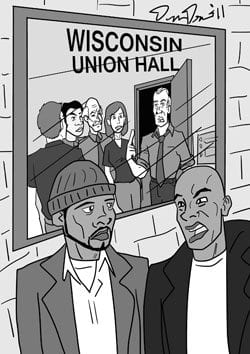
More realistic negotiations
Collective bargaining in industry has been an effective system to resolve conflicts between labor and management. Both sides know what they want. Labor is concerned about wages, benefits and work rules. Management wants a level of labor costs that does not inflate the price of the product and reduce market demand.
Both labor and management understand the cost of failure. If there is a strike or a lockout, workers will receive no more paychecks. If production stops, then management has no more product to sell once inventory is gone. Then management will have no sales revenue to defray the payment of fixed costs.
Now three-fourths of the states allow collective bargaining by all or some of the local government employees. However, there is a major difference with the industrial model. The management in an industrial negotiation has direct responsibility for meeting the financial demands of the agreement. In the public employee model, it is the taxpayer who bears the financial burden, but the taxpayer does not participate in negotiations.
Taxpayers in many states and cities find themselves in financial difficulty in their efforts to meet the fiscal demands of generous contracts with public employees. According to the Massachusetts Taxpayers Foundation, state residents face a $20 billion increase in taxes in the coming years just to pay the health insurance benefits of retired municipal employees.
Understandably, union membership for public sector workers has grown across the country as union leaders have been able to negotiate rich contracts. According to the U.S. Bureau of Labor Statistics, 36.2 percent of public sector workers were union members in 2010. That is substantially higher than the 6.9 percent rate of unionized private sector workers.
Ironically, 50 years ago Wisconsin was the first state to give public workers the right to collective bargaining. Today, the newly elected governor of Wisconsin, Scott Walker (R), wants to restrict those rights. However, with financial problems in many states because of generous contracts, Walker is generating considerable support and interest across the country.
Taxpayers are unwilling to finance retirement funds and health benefits for public workers that are more generous than their own. There must be a reasonable modification to the present system.
A damaging policy
Americans have endured an extended period of joblessness. In May the unemployment rate was 9.7 percent. The Federal Reserve Bank has predicted that would improve to only 8.9 – 9.12 percent this year although the economy is emerging from recession.
The Equal Employment Opportunity Commission (EEOC) is investigating a restrictive employment practice that will impede opportunities for the unemployed. Some recruiters and employers will not even consider the unemployed when seeking new personnel.
This approach disproportionately eliminates minorities from consideration. Back in May only 8.8 percent of whites were out of work compared with 15.5 percent of blacks and 12.4 percent of Latinos. As of a year ago, 22.1 percent of those who were out of work for a year or more were black.
Restricting new hires to those who are already working elsewhere has the unintended consequence of discriminating against minorities because so many are out of work. A policy that discriminates even unintentionally could violate the law.
Black leadership organizations ought to contact the EEOC and look into this matter.






